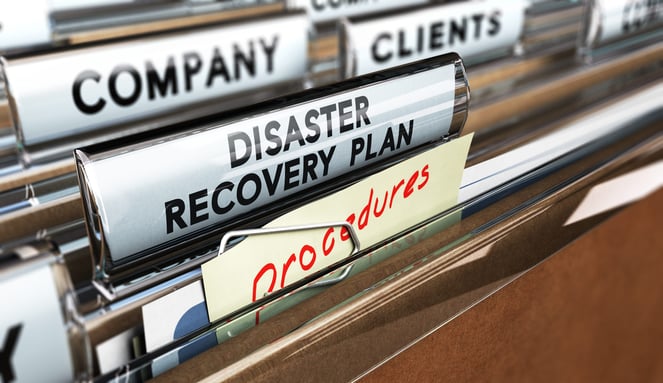5-Point Checklist for Small Business Disaster and Document Recovery Planning
Thu, Sep 06, 2018
By: Jim Beran

Everybody who lives along the Gulf Coast knows that it pays to be prepared for a weather-related disaster. In recent years, hurricanes have ravaged both southern Florida and the panhandle, destroying buildings and causing extensive flooding.
Of course, natural disasters aren’t the only disasters. Fires and other hazards can put your business documents and data at risk. At Gilmore Services, we specialize in helping our clients prepare for the unthinkable – and we’ve put together this 5-point checklist to help you put a disaster and document recovery plan in place for your small business.
#1: Identify the records and resources you must have to keep your business running
The first step should be identifying the records and resources you need to run your business. For example, you might not need expired client files right away, but you will need access to active files and the resources you need to service your clients, keep your books, and manage your employees.
The reason you want to identify necessary documents first is that you must ensure you can get to them quickly at any time.
#2: Identify a records services company to be your partner
Next, you should look for a record services company to partner with you as you create your disaster recovery plan. At Gilmore Services, we work closely with our clients to ensure that their valuable data is protected.
Specifically, you should look for a company that offers:
- A secure, fire-rated storage facility
- Mobile freezing units to protect your documents from water damage
- Safe shipment of your documents to a secure site if needed
- Portable water detection units to spot hidden damage to documents
- 24/7 access so you can get what you need when you need it
The right company will work with you to identify your needs and provide solutions.
#3: Cloud storage for vital documents
We strongly suggest to our clients that they consider storing their most important documents in the cloud. Cloud storage is not susceptible to fire or flood damage. And, because it’s regularly backed up, it’s less likely than physical storage to be at risk of hardware failures.
It’s important to note that cloud storage may not be able to take the place of physical storage. Many laws, such as HIPAA and FACTA, require companies to keep physical copies of certain records. That’s why you should partner with an experienced record services company familiar with the regulations that are relevant to your company and can execute storage and security properly.
#4: Decide on a secondary business location
Living in Florida, it’s a good idea to have a secondary business location where you can set up shop in the event that your primary location is affected by a disaster. For example, you might set up a satellite office with a few workstations and some key resources in a rented space or even in someone’s home. You’ll only use the space if your primary location is damaged to the point that you can’t use it.
You’ll need to make sure that your employees know about the second location. And that leads us to our final step.
#5: Employee Training and Disaster Protocols
Your final step is to create a set of disaster protocols for both employees and clients to be followed in the event of a disaster. The protocols should include individual and group responsibilities. For example, employees might be instructed to report to your secondary location, and one employee might be in charge of accessing vital information from the cloud.
Once the protocols are in place, it’s essential to train employees so they know what to do in a disaster. You should also let clients know that you have a disaster recovery plan in place and reassure them that you will be in touch with them as needed.
Conclusion
Nobody can predict when a disaster will occur, but that doesn’t mean that you can’t make a comprehensive disaster recovery plan for your business. Having one in place will give you and your clients peace of mind.
To learn how Gilmore Services can help you create a disaster and document recovery plan for your business, please click here now.
